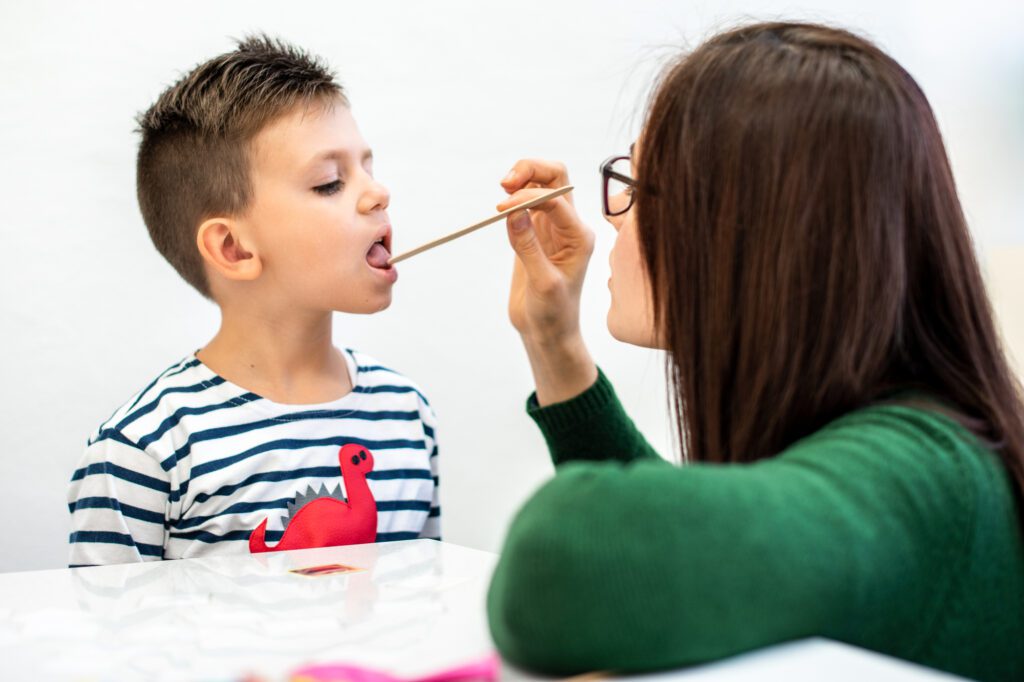Aurora Speech Clinic serves the Aurora and Newmarket areas at our clinic in Aurora, and one of the speech-language pathology services we offer is pediatric speech therapy.
We also offer speech-language pathology services to children and families virtually across all of Ontario.
If your child is demonstrating difficulties with speech, language, communication, literacy or swallowing, Aurora Speech Clinic can help.
Our team of registered pediatric speech-language pathologists is passionate about providing personalized, family-centred care that is based on the best available evidence.
Why Choose Aurora Speech Clinic For Kids?
In Depth Assessment
Every child is unique.
The first step in your child’s speech therapy journey begins with an assessment to determine their strengths and areas where they may benefit from support.
The assessment process aims to identify any communication disorders or delays and to determine the most appropriate treatment plan.
Here’s an overview of how a pediatric speech-language pathology assessment typically works:
Initial Consultation
During this consultation, the speech therapist gathers information about the child’s medical history, developmental milestones, and concerns regarding their speech and language development. They will also ask detailed questions about the child’s birth and medical history, family history of speech or language disorders, and any other relevant information.
Observations
The speech therapist may observe the child’s behaviour, communication skills, and interaction with others during the initial consultation.
Standardized Assessments
Standardized assessments are formal tests and tools designed to assess various aspects of a child’s communication skills. These assessments help the speech therapist gather objective data and measure the child’s abilities against age-appropriate norms.
Informal Assessments
In addition to standardized assessments, the speech therapist may use informal assessments, which include play-based activities and conversations with the child. Informal assessments provide insights into the child’s communication in more natural interactions.
Parent & Caregiver Input
Parents and caregivers play a crucial role in the assessment process. They are encouraged to share their observations, concerns, and goals for their child’s speech and language development.
Analysis & Identification
After collecting data from standardized and informal assessments, as well as input from parents and caregivers, the speech therapist analyzes the information to identify any communication delays or disorders.
Treatment Plan
Based on the assessment findings, the speech therapist develops an individualized treatment plan tailored to the child’s specific needs. The plan outlines goals, objectives, and the recommended therapy approach.
Therapy Recommendations
The speech therapist discusses the assessment results and the proposed treatment plan with the parents or caregivers. They provide recommendations for speech therapy sessions, frequency, and duration.
Ongoing Monitoring
Speech therapy is an ongoing process, and progress is continually monitored. Periodic reassessment may be conducted to measure the child’s improvement and adjust the treatment plan as needed.
Remember that the specific assessment process may vary depending on the child’s age, needs, and the speech therapist’s approach.
Extensive Continuing Education And Training
Aurora Speech Clinic is home to a multifaceted team of speech-language pathologists for kids.
Each of our clinicians has a variety of areas of clinical focus to best serve the community.
Regardless of your child’s speech, language, or literacy concerns, our team is here to provide treatments tailored to your child’s unique needs.
We offer services in the English, French , Mandarin, Cantonese, and more.
Our clinicians have additional training and certifications in the following treatment approaches or areas (to name a few):
The Hanen Caregiver Training Programs
Speech Therapy Services For Kids
Below, you’ll find more information on the specific areas we assess and treat.
Is your child not meeting their speech and language milestones? This may be a sign of an underlying language delay or disorder. Speech therapy may help your child meet these milestones more quickly and communicate more effectively, with less frustration.
Most kids occasionally become disfluent when they are learning to speak. However, if this happens frequently, it may be a sign that your child has a fluency disorder (e.g., stuttering). Speech therapy can help your child communicate more fluently and with greater confidence.
If your child is neurodivergent, they may be later to talk or they may demonstrate ongoing differences with play, language, and social communication skills. Speech-language pathology can help your child communicate, connect, and self-advocate.
Speech sound disorders is an umbrella term that encompasses a wide variety of disorders that impact overall speech clarity. These include childhood apraxia of speech, articulation disorders, phonological disorders, and more. Speech therapy interventions can help.
Does your child seem to have difficulty when it comes to eating? Are they unable to swallow their food? Or do they seem extremely picky when it comes to the types of foods they’re willing to eat? If so, this may be a sign of a feeding or swallowing disorder. We can help.
We often take for granted our ability to read and write, but these are complex skills that many kids struggle to develop. Literacy skills are also strongly linked to oral language abilities. If your child has difficulty with early literacy, reading, or writing a pediatric speech-language pathologist can help.
Pediatric voice disorders refer to any condition that affects the quality, pitch, loudness, or resonance of a child’s voice. These disorders can occur in children of all ages due to things like nodules, laryngomalacia, reflux, stridor, etc. Speech therapy can help.
